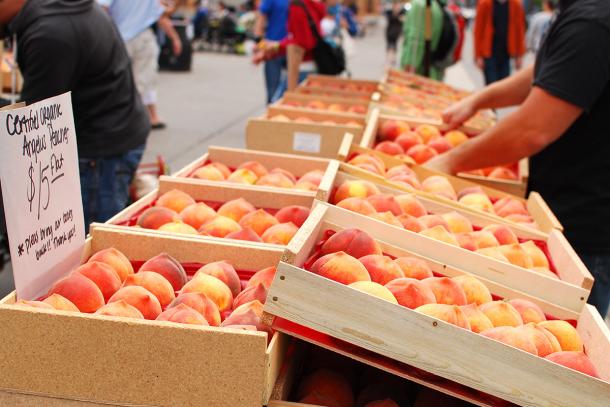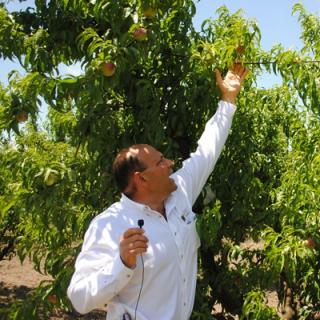The Last Great Peach Event?
Brie Mazurek, CUESA Staff
July 24, 2015

Each August, farmers market shoppers look forward to the height of peach season, a sticky-sweet time when the stone fruit stars of summer have their day.
“We get the best varieties like the O’Henry and the Angelus, both full of flavor and lots of sugar,” says third-generation farmer Victor Martino of Bella Viva Orchards. “Not that the peaches aren’t good in June and July, but the best ones come in August.”
And nothing heralds peak peach season like Bella Viva Orchards’ Great Peach Event, now in its seventh year at the Ferry Plaza Farmers Market, scheduled for August 1. Fruit-laden trees yield such a heavy crop that the Martino family offers flats of freshly picked organic peaches at half price, for one day only, much to the delight of pie bakers, preserve makers, and peach fanatics of all stripes.
But the summer indulgence comes with some sobering news: if the drought persists, this could be the last year not only for the Great Peach Event, but for the Martino family’s fruit farming. This year Bella Viva received half their usual water allotment. Next year, the family may have to start tearing out their orchards.
Conserving Where It Counts
 California’s stone fruit season came about two weeks ahead of schedule this season at many farms. The mild winter caused trees to blossom early, creating earlier fruit set. Like any experienced farmer, Martino has been taking the seasonal fluctuations in stride, but the four-year drought has been difficult to weather.
California’s stone fruit season came about two weeks ahead of schedule this season at many farms. The mild winter caused trees to blossom early, creating earlier fruit set. Like any experienced farmer, Martino has been taking the seasonal fluctuations in stride, but the four-year drought has been difficult to weather.
Peach trees need 32 to 36 inches of water per year to be fruitful, but this year Bella Viva’s water allotments for their Denair and Modesto properties were only 16 and 18 inches. His orchards of nuts and apricots, peaches, nectarines, plums, persimmons, and other fruit rely on water from the Sierra snowpack. As the snow melts, it slowly fills a reservoir and is released through a canal system and distributed through local irrigation districts. When there’s no snowpack, there’s no water.
With half his usual water allotment, Martino has gotten more creative and conservative with his water use, and been forced to make some tough decisions. He converted five acres of prune orchards to irrigation from his domestic well and installed micro-sprinklers, which are far more water-efficient than the traditional method of flood irrigation. He started dry-farming (as in, not watering) his grapes, and he’s pulled out five acres of apricots.
“It’s a terrible situation,” he says. “It’s like, when you don’t have enough food, which kids do you feed, you know?
Fearing for the Future
Looking forward to next year, Martino fears for the worse. “I don’t think our family has been this concerned about the future since about 1921, when they left Italy to come here,” he says.
 Martino’s family started growing stone fruit in California the 1940s. His parents were among the original group of farmers to found Alemany Farmers Market, San Francisco’s first. When Martino took over the farm, he started converting the orchards to organic and expanded the farm’s dried fruit business.
Martino’s family started growing stone fruit in California the 1940s. His parents were among the original group of farmers to found Alemany Farmers Market, San Francisco’s first. When Martino took over the farm, he started converting the orchards to organic and expanded the farm’s dried fruit business.
Another year of drought could put an end to that legacy. “It’s a whole livelihood, not just for me but for others in the same situation,” Martino says. “I try not to think about that, because that’s a scary thought.”
The future for Bella Viva and many other Central Valley farmers depends on the snowpack. If the snow doesn’t come, Martino could face zero water allotment next year. And if stone fruit trees aren’t watered, they start to die. Trees that survive may continue to bear fruit for a while, but the yields are too low to justify the irrigation and labor that goes into maintaining them.
“We can only cut back so much on the water that we give the trees,” he says. “Last year we stretched the little bit that we had too far, and it hurt the bud development.”
Worst case, trees will be torn out, ground up, and sold to electric power plants as fuel. “That would be a travesty,” says Martino. “We’ll be out of the farmers markets, we’ll be out of business, and who knows what I’ll do. I just know how to grow fruit. I don’t know how to do anything else.”
Praying for Rain
If predictions of El Niño come true, we could be in for a wet winter that will help to replenish our snowpack and reservoirs next year, and bring much-needed relief to farmers like Martino. For now, he is praying for rain and hoping for reform in California’s water management, which allows for unlimited groundwater use.
“Groundwater pumping has to be regulated,” says Martino. “Intelligent people in the community have to come together to figure out how to regulate the underground water supply, so that we don’t just use it all up and then it’s gone.”
At the Great Peach Event on August 1, Bella Viva will be offering their perfectly ripe certified organic Angelus peaches, a large, low-acid freestone variety that is reminiscent of the famed Elberta.
“The Angelus is my favorite variety of all peaches, says Martino, “very peachy, very meaty, and not overly dense, but not overly juicy either.” With a beautiful red-gold skin and a peach-perfect golden hue, it’s a model variety for jams, pies, and straight-up eating.
While precipitation may out of our hands, we can support farmers through the drought by savoring peach season while it lasts, and giving thanks for the hard work and precious water that goes into each sweet and juicy bite.
Save the date! The Great Peach Event is next Saturday, August 1. Bella Viva Orchards will be offering flats of certified organic yellow peaches at half price for one day only. That’s just $15 per 10- to 12-pound flat.
Martino family (Belle, Victor, Vivian, and Angie) photo by Ching Lee, California Bountiful.
